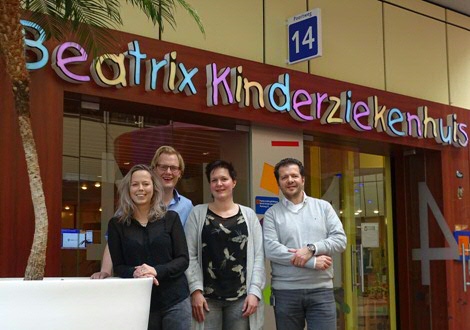
Stofwisselkrachtsubsidie 2017, Maaike Oosterveer, "Stem-cell derived hepatocytes to study patient-specific disease signatures of GSD Ia

Glycogen storage disease type Ia (GSD Ia) is a rare inborn disease caused by a genetic mutation of an enzyme involved in sugar metabolism. Patients are commonly diagnosed with this GSD Ia in the first years of their life because they present with very low blood sugar levels. Because this situation imposes a life-threatening risk, dietary treatments have been developed that aim to prevent low blood sugar levels. These treatments have been proven very successful, and fortunately fewer patients have died from GSD Ia in the last thirty years. But as the GSD Ia population ages, more and more patients suffer from the long-term complications of this disease.
The causes of these complications, which are severe and include kidney disease and liver cancer, are poorly understood. It is also not clear if these complications are related to the abnormalities that are found in the blood of GSD Ia patients when they visit our hospital. Finally, we found that there are large differences between individual GSD Ia patients with regard to the severity of blood abnormalities as well as their clinical complications.
It is thus important to develop tailored treatments for GSD Ia patients who are at risk to develop complications. To achieve this, we first need to understand the mechanisms that cause the complications, and why individual patients can be so different. For this purpose, we will generate ‘disease signatures’ of individual GSD Ia patients from liver cells, which in turn are cultured from stem cells isolated from urine. This signature will be composed of genetic, protein, and metabolite information that will be obtained via sophisticated analyses of the liver cells. We will compare the disease signatures from patients with different disease severities, and with the signatures from healthy control subjects. This will allow us to establish whether patient-specific signatures can explain the differences in blood abnormalities and complications between patients, and whether these signatures can be used to develop tailored treatments to prevent complications in patients who are at risk.
Glycogeen stapelingsziekte type 1a (GSD Ia) is een zeldzame, aangeboren aandoening van de suikerstofwisseling. Deze ziekte wordt meestal in de eerste levensjaren ontdekt wanneer kinderen met zeer lage bloedsuikerspiegels in het ziekenhuis terecht komen. Omdat lage bloedsuikerspiegels levensbedreigend kunnen zijn is in de meeste gevallen een strikte dieet therapie noodzakelijk. Door het beschikbaar komen van deze dieet therapie is de sterfte in de afgelopen decennia sterk gedaald, maar tegelijkertijd kampen steeds meer volwassen patiënten met de chronische complicaties van GSD Ia. De oorzaken van deze complicaties, die vaak ernstig zijn, zijn grotendeels onbekend. Ook zijn er grote verschillen tussen patiënten in de aard en ernst van de complicaties. Tenslotte is het lastig te voorspellen welke patiënten ernstige complicaties zullen ontwikkelen.
Om therapie-op-maat te kunnen ontwikkelen voor patiënten die een verhoogd risico lopen op ernstige complicaties moeten we eerst beter begrijpen hoe de complicaties precies ontstaan, en waarom er zulke grote verschillen bestaan tussen individuele patiënten.
In dit project zullen wij het ‘ziekteprofiel’ van individuele patiënten in kaart brengen door een overzicht te maken van genen, eiwitten en metabolieten van levercellen die we kweken uit stamcellen van GSD Ia patiënten. Vervolgens zullen wij onderzoeken of deze individuele profielen de onderlinge verschillen in de aard en ernst van de complicaties tussen patiënten kunnen verklaren, en of we op basis van de profielen therapie-op-maat kunnen ontwikkelen voor patiënten met een verhoogd risico op complicaties.
More information about the project : www.stofwisselkracht.nl
| Laatst gewijzigd: | 02 mei 2018 17:41 |
Meer nieuws
-
29 april 2024
Sensor met gevoel
In Makers van de RUG belichten we elke twee weken een onderzoeker die iets concreets heeft ontwikkeld: van zelfgemaakte meetapparatuur voor wetenschappelijk onderzoek tot kleine of grote producten die ons dagelijks leven kunnen veranderen. Zo...
-
16 april 2024
RUG ondertekent Barcelona Declaration on Open Research Information
De Rijksuniversiteit Groningen heeft de Barcelona Declaration on Open Research Information (Verklaring Open Onderzoeksinformatie) officieel ondertekend. Dit wordt gezien als een grote stap richting verantwoordelijke onderzoeksbeoordeling en open...
-
02 april 2024
Vliegen op houtstof
In Makers van de RUG belichten we elke twee weken een onderzoeker die iets concreets heeft ontwikkeld: van zelfgemaakte meetapparatuur voor wetenschappelijk onderzoek tot kleine of grote producten die ons dagelijks leven kunnen veranderen. Zo...
